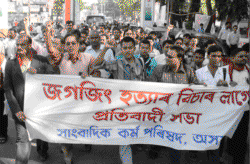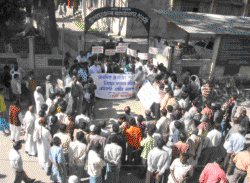Archives
The hazards faced by journalists in the North East.
Earlier, the JACA, an umbrella organization of scribes in Assam, organized a massive protest rally on the premises of Guwahati Press Club. Soon after the meeting, hundreds of scribes and other attendants joined in a procession to the office of the Deputy Commissioner of Kamrup (Metro) to hand over the memorandum to the President. But shockingly the DC did not come out to receive it which annoyed the journalists and tempted them to stage a brief demonstration in front of his office. Later the memorandum, signed by the JACA president Sanjib Phukan and JACA secretary Prakash Mahanta, was sent directly to the office of the President.
The trouble torn region earlier witnessed the brutal killing of a scribe in Imphal on November 17, when unidentified assailants shot and killed Konsam Rishikanta, a trainee sub-editor of The Imphal Free Press, an English daily of Manipur. The Manipur police is yet to make any breakthrough as no armed group has so far claimed responsibility for the killing.
The All Manipur Working Journalists’ Union, Editors’ Forum, Manipur had taken the path of agitation and had gone for a four-day strike by all Imphal-based daily newspapers and local channels in protest against the murder of Rishikanta. The union members also met the Manipur Chief Minister Okram Ibobi Singh and demanded prompt investigation and action against those responsible for the killing. Manipur has lost five editor-journalists to miscreants’ attack since 1993.
The editor’s forum in a statement said, “The Editors Guild has noted with increasing dismay the spate of violent incidents involving journalists in the North East and has brought this to the notice of the Union Home Ministry. We hope that concerted action will be taken to ensure the safety and security of journalists.”
The Guild president, Rajdeep Sardesai later personally met the Prime Minister to apprise him about the situation in the Northeast. Rajdeep, also the editor-in-chief of CNN-IBN, while talking to this writer informed that Prime Minister Singh expressed concern over the recent killings of journalists and asked both the Chief Ministers of Assam and Manipur for prompt investigations into the incidents. He also recommended adequate measures to ensure the security and safety of all journalists and newsmen in the region, Rajdeep added.
Facing the heat, the Assam Chief Minister Tarun Gogoi announced an ex-gratia grant of Rs three hundred thousand for the family of Jagajit three days after the incident. Gogoi also assured that the government would take responsibility of Jagajit’s daughter. The Chief Minister also declared that the culprits would be arrested and appropriate punishment would be given to them.
The Paris based media rights body, Reporters Without Borders also expressed shock at the assassination and asked ‘the authorities in New Delhi to order the Central Bureau of Investigation to carry out an exhaustive investigation to determine the motives and arrest those responsible.’
The rights body also argued that the security situation is very worrying in the North East and it can not be acceptable that journalists should be made to pay for refusing to relay propaganda for the different parties in a conflict. This latest murder must not go unpunished, it asserted.
The Assam Tribune in its editorial highlighted that ‘Saikia’s murder in broad daylight — occurring just four days after the killing of another journalist, K Rishikanta in Manipur – lays bare the growing vulnerability of the journalists working in conflict situations in the North East’. “Targeting of journalists by militants and anti-socials is nothing uncommon in the region, with Assam alone accounting for the killing of half a dozen journalists in the past eight years. This is a rather disturbing trend, and the failure of the Government and the law-enforcing agencies to book the culprits in most of the cases is only emboldening the miscreants to carry on with their dastardly acts,” the editorial commented.
The New York based Committee to Protect Journalists also mourned the loss of Jagajit. The CPJ’s Asia Program Coordinator Bob Dietz, while raising voice for ‘thoroughly and transparently’ investigating Jagajit’s killing, also added, “Local governments in India’s North East should make journalists’ security a priority to enable publication of essential news about local conflicts.”
“It has been a grim year for journalists across the world. So far in 2008, at least 36 journalists have been murdered and another 17 are missing or unconfirmed as to whether they died on the job. Across Asia, two each were killed in Thailand, Afghanistan, the Philippines, Sri Lanka, four in Pakistan and at least three in India,” reports the CPJ last month.
International Federation of Journalists, Journalists’ Forum, Assam, All Assam Photo Journalists Association, Assam Press Correspondents’ Union, North East Media Forum (a body of New Delhi-based Northeastern Journalists) along with a number of journalists organizations, student organizations, civil society groups and various political parties also condemned the killing and demanded apt punishment for the perpetrators.
Condemnation also poured in from Sudhir Karmakar (secretary of Kolkata Press Club), Pranab Sarkar (secretary of Agartala Press Club), Bhim Rawat (secretary of Sikkim Press Club), David Laitphlang (president of Shillong Press Club), S. Hemant (president of All Manipur Working Journalists’ Union) and many others.
The editorial also stated that ‘one must realize that if there is any community that faces the greatest threat from the graduation of insurgency to criminal terrorism and that, despite the threat, must keep working because that is what their profession demands of them, it is the community of journalists, unarmed and defenseless’. ‘Therefore, it is they who need the best protection; after all, it is they who serve democracy in the best manner possible,’ it concluded.
The JACA memorandum to the President revealed that the North East is home to more than 50 armed outfits which have been fighting New Delhi for various demands varying from sovereignty to self rule. The militants display a common tendency to defy the democratic values of the country.

